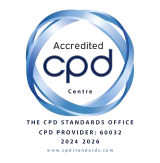

Physical restraint should only ever be used as an emergency intervention to respond to individuals posing an immediate danger to themselves or others.
This physical restraint awareness course is designed to give you an insight in how to maximise the safety of both healthcare worker and patient in a crisis situation, showing that physical restraint should only be used as a last resort after all other de-escalation techniques have failed. Healthcare workers are taught to focuses on identifying confrontational behaviour at its earliest stage and by the use of verbal and physical interventions reduce the chances of further escalation.

We're proud to share that all our E-learning courses are assured by City & Guilds, a global benchmark for excellence. This recognition highlights our commitment to delivering high-quality training that truly makes a difference.

Our courses support lifelong learning and professional growth, accredited by the CPD Certification Service to ensure they meet recognised standards for Continued Professional Development.
Take a closer look at our E-learning experience. Below, you’ll find screenshots from the course alongside a sample certificate you’ll receive upon completion (click to view).
Our courses are designed to be engaging, intuitive, and practical, giving you the tools and confidence to excel in your field.
If you would like to see how our E-learning platform works before purchasing, click on the 'try before you buy' button below and you can try a full length Elearning module, completely free of charge!
Try Before You Buy